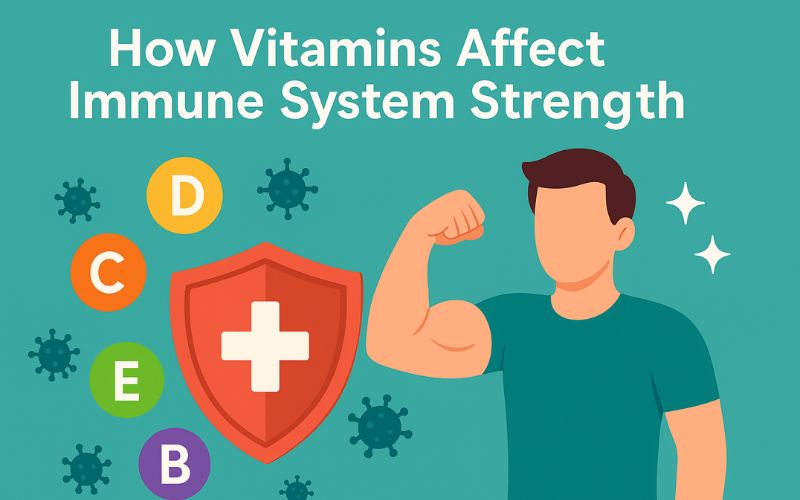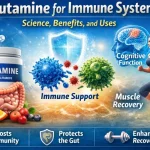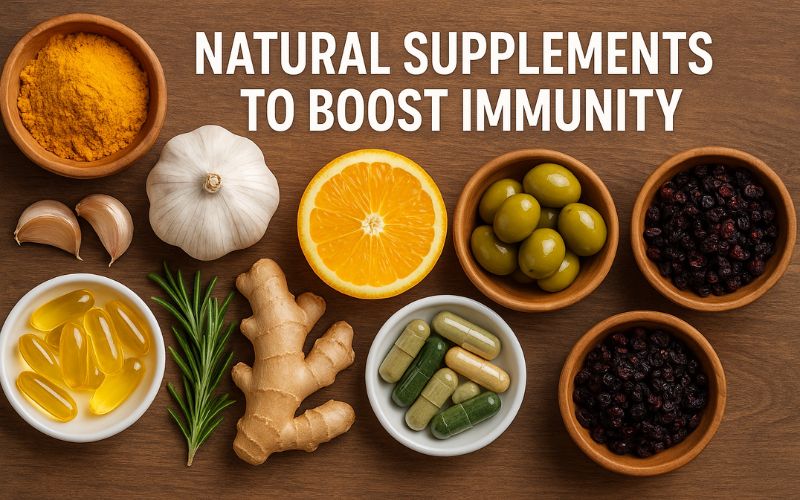Your immune system is your body’s shield against infections, but its effectiveness depends heavily on nutrition. Among all nutrients, vitamins play a central role in strengthening immunity, supporting recovery, and reducing the risk of illness. Unfortunately, many people underestimate their daily vitamin needs or turn to poor-quality supplements that don’t deliver results. This guide explains how vitamins affect immune system strength, their key benefits, and the best ways to include them in your lifestyle.
Table of Contents
Why Vitamins are Essential for Immunity
Vitamins act as cofactors and regulators in immune processes. They support the production of white blood cells, regulate inflammation, and maintain natural barriers against infections. Without adequate vitamin intake, the immune system becomes less effective at fighting bacteria and viruses. To ensure daily balance, many individuals turn to multivitamin and mineral supplements for consistent support.
Boost your immunity naturally—discover how the right vitamins strengthen your body’s defenses today.
Key Vitamins That Strengthen the Immune System
Every vitamin contributes differently to immune health. Before diving into details, it’s important to understand that a balanced intake of multiple vitamins offers stronger protection than relying on a single one.
- Vitamin C: Known as the immunity booster, vitamin C helps stimulate white blood cell activity, supports antioxidant defense, and reduces the severity of infections.
- Vitamin D: Plays a vital role in regulating immune responses and has been linked to lower risks of respiratory illnesses.
- Vitamin E: A powerful antioxidant that protects immune cells from oxidative damage.
- Vitamin B-Complex: Assists in producing red and white blood cells while maintaining energy levels.
- Vitamin A: Strengthens the body’s first line of defense by supporting healthy skin and mucosal barriers.
For holistic support, pairing vitamins with omega-3 supplements can reduce inflammation and enhance immunity further.
Daily Requirements & Deficiency Risks
Each vitamin has a recommended daily intake that varies by age, gender, and lifestyle. For example, adults typically require 65–90 mg of vitamin C and 600–800 IU of vitamin D daily. Deficiencies can cause frequent colds, fatigue, weak wound healing, or in severe cases, chronic immune dysfunction.
Micronutrient imbalances also play a role. A lack of zinc, for instance, compromises the body’s ability to fight infections. More on this can be explored in our guide on zinc deficiencies.
Best Sources of Immune-Boosting Vitamins
The strongest immune defense comes from a mix of natural foods and supplements.
- Food Sources: Citrus fruits (vitamin C), eggs (vitamin D), almonds (vitamin E), leafy greens (vitamin A), whole grains (B-complex).
- Supplements: Multivitamins, vitamin C tablets, and fortified proteins for those with higher nutritional demands. Athletes often rely on options from the whey protein category since some blends include added vitamins and minerals for recovery.
Best Time to Take Vitamins for Immunity
Timing can influence absorption and effectiveness. Water-soluble vitamins (like C and B-complex) are best taken in the morning with water, while fat-soluble vitamins (like A, D, and E) absorb better with meals containing healthy fats. For a detailed breakdown on supplement timing, see our guide on the best time to take supplements for muscle gain, which also applies to immune health.
Common Mistakes with Vitamin Use
Vitamins can transform your immune health, but only if used correctly. Some common mistakes include:
- Over-supplementation: Excess vitamin intake may lead to toxicity.
- Ignoring diet: Supplements are not a substitute for balanced meals.
- Low-quality products: Fake or uncertified supplements may harm more than help.
To stay safe, check our article on how to spot certified supplements in Pakistan.
Expert Tips for Building Vitamin-Strong Immunity
Strengthening immunity is not just about taking a pill — it requires a holistic approach. Experts recommend:
- Combining vitamins with a balanced protein intake.
- Staying active to improve circulation and immune efficiency.
- Supporting your stack with recovery supplements in the strength & endurance category for overall health resilience.
Conclusion
Vitamins are the backbone of a strong immune system, supporting everything from antibody production to cell repair. Without them, the body becomes vulnerable to illness and slow recovery. By prioritizing foods rich in vitamins, supplementing wisely, and ensuring authenticity, you can unlock stronger immunity and better health in 2025.
To get started, explore authentic options in our multivitamins and minerals category and build a daily routine that keeps your defenses strong.



























